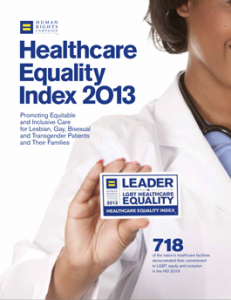 WASHINGTON – American hospitals and clinics are increasingly committed to equality for their lesbian, gay, bisexual, and transgender (LGBT) patients, according to a report published July 11 by the Human Rights Campaign (HRC) Foundation, the educational arm of the nation’s largest LGBT civil rights organization, at a press conference at the Department of Veterans Affairs in Washington, DC. The new report indicates that a record total of 718 healthcare facilities nationwide, including 121 veterans’ medical centers, have explicitly pledged themselves to equal treatment for LGBT patients.
WASHINGTON – American hospitals and clinics are increasingly committed to equality for their lesbian, gay, bisexual, and transgender (LGBT) patients, according to a report published July 11 by the Human Rights Campaign (HRC) Foundation, the educational arm of the nation’s largest LGBT civil rights organization, at a press conference at the Department of Veterans Affairs in Washington, DC. The new report indicates that a record total of 718 healthcare facilities nationwide, including 121 veterans’ medical centers, have explicitly pledged themselves to equal treatment for LGBT patients.
“The country’s healthcare facilities are leading figures in our nation’s movement toward full equality and inclusion for LGBT Americans,” said HRC President Chad Griffin. “The Department of Veterans Affairs’ participation in the HEI is another example of President Obama’s unwavering commitment to those who put their lives on the line for the country they love, regardless of who they love.”
The report details the results of the most recent Healthcare Equality Index (HEI), an annual survey administered by the Human Rights Campaign Foundation. The 718 facilities included in the HEI 2013 represent a 153 percent increase in participation over last year’s survey. An unprecedented 74 percent of HEI 2013 respondents won recognition as “Leaders in LGBT Healthcare Equality” after meeting four foundational criteria for equitable LGBT care, a 199 percent increase in facilities achieving this status.
In a major breakthrough, 121 of the nation’s 151 Veterans Health Administration (VHA) medical centers participated in the HEI 2013, compared to just one VHA participant in the HEI 2012. Nearly 80 percent of the participating VHA facilities were awarded Equality Leader status in the HEI 2013, as they sought to welcome LGBT veterans who have served their country.
“We were pleased to have this opportunity to foster a more inclusive environment for our LGBT Veterans and their families,” said Robert L. Jesse, MD, PhD, VHA Principal Deputy Under Secretary for Health. “Our participation in the HEI 2013 exemplifies our untiring efforts in the pursuit of health equity for all of our veterans.”
The HEI helps hospitals assess themselves against established best practices and ensure that they are complying with legal, regulatory and accreditation requirements for LGBT non-discrimination. The HEI 2013 participants were congratulated for their explicit commitment to non-discrimination by Leon Rodriguez, Director of the Office for Civil Rights of the U.S. Department of Health & Human Services.
“The Obama administration and our department are deeply concerned about equality for all Americans,” said Rodriguez. “It is gratifying to see so many healthcare facilities commit themselves to the goal of equitable, unbiased care for all.”
Ninety-three percent of HEI 2013 participants explicitly prohibit discrimination against lesbian, gay and bisexual patients, and a record 87 percent ban discrimination against transgender patients. Additionally, 90 percent of respondents explicitly grant equal visitation rights to same-sex couples and same-sex parents. This represents a significant increase since the Department of Health and Human Services issued rules in 2011 requiring all hospitals that receive federal Medicare and Medicaid funding–nearly every hospital in America–to protect the visitation rights of LGBT people.
The HEI 2013 required participating facilities to document that employees in key work areas had received expert training in LGBT health needs. As a result, nearly 5,000 healthcare personnel nationwide, including senior administrators, participated in training provided through the HEI, a unique educational initiative.
Studies, including a 2011 Institute of Medicine report, have repeatedly shown that the LGBT community faces health disparities and healthcare discrimination and that many LGBT Americans are concerned about experiencing bias in healthcare. But as the HEI 2013 indicates, healthcare facilities are increasingly seeking to assure them that they will receive equal treatment.
“No one should have to worry about receiving discriminatory healthcare,” added Griffin. “We’re very pleased to offer hospitals and clinics a comprehensive resource for equitable care, and we celebrate all of those who used the HEI 2013 to welcome LGBT patients, employees and families.”
View the HRC Foundation’s Healthcare Equality Index 2013 at www.hrc.org/hei.











